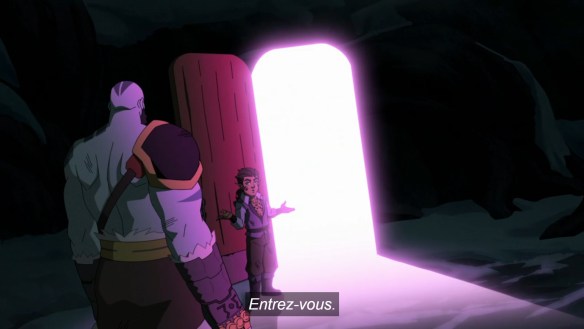Hello folks, and welcome back to Wrong Every Time. Today we return to Vox Machina in a moment of unqualified triumph, as they have not only retrieved Pike’s spiffy new breastplate from the depths of hell, they’ve also managed to kill the ice dragon Vorugal in the bargain. The Chroma Conclave’s most relentless bulldog, and the destroyer of the party’s own delightful chateau, now lies buried among the frigid wastes of Tal’Dorei. It’s starting to seem like our team might actually pull this off!
Given that, I imagine Mercer has some terrible reckoning awaiting our heroes. DnD campaigns obviously shouldn’t feel hopeless, but they also shouldn’t feel effortless – ideally, the party should feel like they have the weight of the world on their shoulders, but that their best efforts might just come to some triumphant end. In practice, this tends to mean DnD drama follows a sort of roller coaster structure, building the party up just to send them plummeting down, often at moments aligned with some sort of narrative act change. My own prior campaign integrated such plummets at the conclusion of its first and second acts, letting each act finale serve several roles: offering a massive action payoff, reaffirming the party’s bonds with the world and characters, and putting the overall forces of good on the backfoot in order to give the party room to rise again.
So far, Vox Machina’s only such reckoning has been the arrival of the Chroma Conclave. Given their recent successes, I imagine we’re due for some manner of rude awakening, something to assure both party and audience that Thordak still has the upper hand. Mechanical and narrative design are in agreement on this one: challenges must feel challenging, drama must feel heart-pounding, and parties that are doing too well must be properly chastened. Let’s drop that other shoe, Mercer!
Episode 6
Ah right, we were last on the verge of exploring Scanlan’s magical bachelor pad, which is presumably his version of the Mordenkainen’s Magnificent Mansion spell. Spells like that leave a ton of wiggle room for defining how they actually resolve, meaning they’re a place where mechanics and creativity entwine, allowing the player to express their character’s personality through the dimensions and decor of their ideal fantasy home. Scanlan’s player seems largely indifferent to high fantasy drama or combat, but this is the sort of place where he shines, going above and beyond in bringing his own magical villa to life
Beyond broad player-interest archetypes like players who are into mechanics versus those into roleplay, there are lots of smaller pleasures in DnD whose prominence should generally be dictated by a given party’s relative interest. My campaign has trade and a general economy because one of my players likes nothing more than to manage his business holdings; if you’re DMing properly, your world should expand or contract to match the shape of your players’ passions
Oh no, I hear that hi-hat building. Scanlan’s got a song coming
Yeah, this place has got everything. No surprise Scanlan demanded a hot tub
Seeing the party’s allies arrayed in this OP makes me wonder how much this adaptation has condensed their company. I probably went overboard in my first campaign; I wanted to do a grand struggle between nations, so we ended up with around two dozen main players, and a generous scattering of smaller figures. I like writing characters!
Vax visits Percy for a heart-to-heart in the pool, which given Percy’s reaction presumably means Vex just ducked under the water or something
Yep, so it goes. Nice to see these two actively addressing their emotional baggage, though. With a sufficiently confident group of players, internal party drama can provide the majority of a campaign’s emotional conflict, and also furnish each external victory with the satisfaction of building off your hard-won mutual trust. New players will likely act more like a collective peanut gallery, their eyes always towards the DM – after you gain enough confidence to take the spotlight in-character, you generally start to recognize all the opportunities inherent in your characterization being directly contrasted against that of your fellow players. With our current campaign in Strahd, that’s providing practically all of the emotional drama, as the on-book stuff isn’t particularly engaging. We’ve got a young son of nobility taking our adventure as a personal affront, a jaded pirate who’s happy to needle said noble, and my kind-hearted cleric in the middle, putting her foot in her mouth even as she just tries to make everyone get along
Meanwhile, Grog and Pike are busy wrecking the place, eager to test out Pike’s new armor. Some character dynamics are pretty effortless
Urged on by Percy’s words, Vax tries to patch things up with Keyleth. They’re doing a fine job of condensing what I assume was a lot more will they-won’t they into a pretty concise romantic arc
Percy and Vax make for a nice parallel – Percy’s learning to actively seek and build a sustainable future, rather than destroy himself seeking revenge, while Vax’s bargains and visions are leading him to abandon anything but the present moment
On the other hand, I assume Scanlan’s regrets regarding his daughter have been given a bit more focus via this adaptation. That thread is often carried simply by Scanlan staring at his daughter’s picture from time to time, which I doubt was something Scanlan’s player was persistently announcing to the table. DnD isn’t a great format for exploring character interiority; all of its drama is defined by interaction with other characters and the external world, and having players announce their characters’ secret feelings would be clumsy regardless. This fact actually took some adjustment on my part, given my love of interiority-first stories like Evangelion and Monogatari
“We can’t keep chasing vestiges all over the map. How many are enough – three, five?” Vax raises a question so sharp it seems tinged with an edge of genuine player frustration. If you’re going to ask your party to go collect dragon balls, you need to at least tell them how many dragon balls are out there, lest you risk them assuming you’re just dragging out their trials with more and more busywork. Dragon ball hunts are inherently busywork, so everything you can do to give such a hunt a sense of genuine structure is welcome
Scanlan then explodes at the table, still choked up with guilt regarding his daughter
“You’re not horrible, you’re just caring for someone else for the first time, and it’s freaking you out.” Ouch, Pike. This is a big part of the conversational dynamic of my current cleric – apparently “killing them with blunt kindness” is a pretty natural cleric affectation
Pike helps Scanlan check on Kaylie, and they learn she is still hoping for his reappearance. Welp, it’s been fun, Scanlan
I wonder how much of this drama was the player’s intended path, and how much was the player just sorta getting sick of playing Scanlan. There’s no shame in an honorable discharge if you feel your character has outlasted their role in the story, and Scanlan’s always been averse to actually engaging with high fantasy drama
Thus Scanlan steps back from their teleportation circle, and resolves to reunite with his daughter
Meanwhile, the rest return home to see Whitestone burning. Yep, here’s that reckoning I was talking about
The party breaks into a variety of groups to simultaneously defend the tree, castle, and people of Whitestone. I am exceedingly curious as to how this was handled in-session; it would have been easy enough to jump between active groups, but I’ve also done a fair amount of experimenting with larger battlefields containing multiple fronts, where different members of the party are pursuing their own objectives in general combat turn order. I’ve found this works very well for Seven Samurai-style holdout missions, with different portions of the party defending different weak points of a town’s defenses
“We’ll deal with this, Percy. Go find your sister.” As I said in the intro, one of the big potential payoffs of these reckonings is their affirmation of the party’s work so far, and the trusted allies they’ve acquired across their journey. Nothing like the party and their hard-earned friends collaborating in defeating some grand evil to remind the players of how far they’ve come, and how much they’ve accomplished
They’re also a pretty handy “false clock,” offering an implication of urgency in the party’s mission without actually binding them to a timer. You could theoretically bind the party to a real clock, but I’m pretty sure the only result of that would be player anxiety and frustration, so why would you? Design space existing isn’t by itself a convincing reason to exploit it; you must first discover whether that design space leads to productive, compelling player experiences
Cassandra is busy holding off a dragon with a fencing rapier, an inherent nod to the frequent absurdity of DnD’s combat mechanics
Now that I’m actually playing a cleric, I can more fully appreciate the primacy of the shield in Pike’s fighting style. Having your defining tool for combat interaction be a defensive instrument naturally encourages distinct ways of approaching combat, both in mindset and mechanics
And here’s our stark visual representation of how badly our heroes have been beaten: the castle of Whitestone, seat of their power and icon of Percy’s hopes for the future, is now collapsing. I actually had my own party’s capital city get nearly destroyed twice, with the second attempt accompanying a country-wide infernal invasion that had them teleporting between three different battlefronts
I suppose Mercer pulled basically the same thing, with Whitestone demanding both a liberation and a defense mission. It’s good to have places the characters care about!
Keyleth claims this attack was Raishan’s doing, and Raishan promptly shows up to defend herself
Raishan makes some pretty valid points regarding Ripley’s culpability in this attack, just barely forestalling a big ol’ dragon fight. Unfortunately, that’s not enough to keep them from severing their alliance
And Done
See, heroes? You take just one moment to relax and exult in your previous successes, and look what it gets you – a scorched city, a new nemesis, and a host of baby dragons flying around fucking up everyone’s business. Well, we hit precisely the dramatic swerves I expected this episode, which says less about my prognosticative capabilities than the generally reliable nature of narrative structure. After so many unqualified successes, the party needed to feel like they were on the backfoot again, and scorching Whitestone was absolutely the most reliable way to achieve it. There is a great satisfaction in watching your players develop some genuine anger towards your antagonists, a frustration that can only arise from first having come to invest in and care about the people of your world. With their home in ruins, I’m eager to see Vox Machina make some exceedingly reckless decisions!
This article was made possible by reader support. Thank you all for all that you do.




